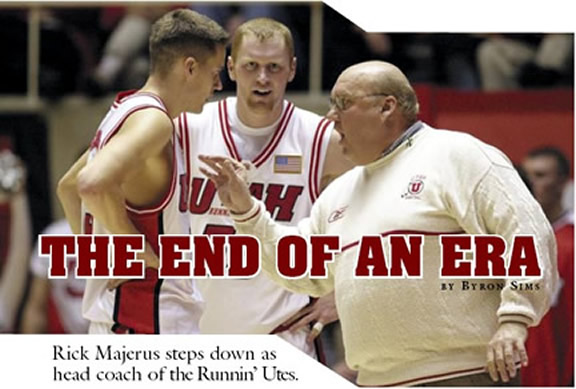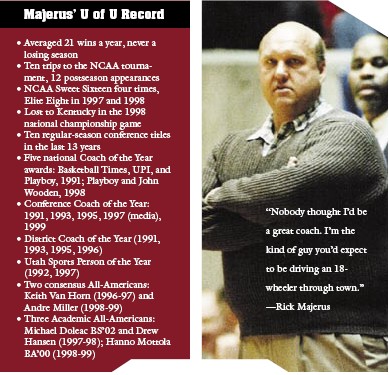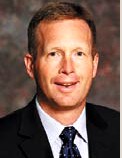
| Vol. 14 No. 1 | Summer 2004 |

For nearly 15 seasons he was the quick-quipping Big Man on Campus, repeatedly leading his Ute teams to conference titles and NCAA appearances, including the 1998 championship game. So Rick Majerus’ announcement in January that he was finished as Utah’s head basketball coach was more than surprising, it was seriously stunning.
Health problems dogged Majerus throughout his U career. Six games into his first year (1989-90), he turned the team over to assistant Joe Cravens and underwent multiple-bypass heart surgery. In 2000-01 he coached only one game, then left to take care of his health and his ailing mother’s.
But the issues didn’t go away. For a man with his cardiac history, his weight was a continuing concern, particularly given the high-stress world in which he worked. After suffering chest pains in January of this year, he placed himself in the care of his personal cardiologist in California. He never returned to the U as coach.
But his legacy remains. Majerus’ .772 winning percentage (323-95) at Utah ranks him in the upper tier of Division I coaches. The percentages of the two coaches who had longer U of U tenures and also won more than 300 games—Vadal Peterson BS’20 MS’46 (1927-53, 385-230) and Jack Gardner (1953-71, 339-154)—are .626 and .668, respectively. “He obviously had an incredible record at the U, and he gave Ute fans a lot to cheer for,” says Chris Hill, U of U athletic director. “Like many others, I hope he takes care of himself. We wish him all the best.”
Yet records and statistics are not the full measure of this complex man, a master of one-liners and mastermind of Xs and Os, at once thoughtful and abrupt, obsessive and sensitive, churlish and charitable. The following insights are from a few of those he coached or worked with, who know him well.
 Keith
Van Horn ex’97, Milwaukee Bucks, one of Utah’s
all-time greats, consensus All-American 1997-98, led Utes to NCAA Finals:
“Very few coaches have a better understanding of the fundamentals
of the game. He has the ability to take guys with average talent and
turn them into solid players. I had natural talent but was really raw,
and he polished me into the player I am today.” Van Horn, who
visited with Majerus in Milwaukee, observes, “Coach needed time
to let his body heal.”
Keith
Van Horn ex’97, Milwaukee Bucks, one of Utah’s
all-time greats, consensus All-American 1997-98, led Utes to NCAA Finals:
“Very few coaches have a better understanding of the fundamentals
of the game. He has the ability to take guys with average talent and
turn them into solid players. I had natural talent but was really raw,
and he polished me into the player I am today.” Van Horn, who
visited with Majerus in Milwaukee, observes, “Coach needed time
to let his body heal.”
Andre Miller BS’98, Denver Nuggets atarting point guard. “Majerus is just a hard-nosed, in-your-face motivator. He stresses the fundamentals of basketball, and he knows how to get the most out of each and every one of his players. I not only learned how to be a point guard, but how to be a leader. He taught me everything I need to know about being a true point guard. I play in the NBA like I was taught in college. I act as a leader on the floor, trying to get everyone else around me to play better, and that is what Coach stressed. Also, I left Utah with a college degree—something else that Coach really stressed, along with basketball.”
Drew Hansen BS’98 BS’98 (double major, economics and political science), Los Angeles attorney, starter on NCAA finals team, Academic All-American, Stanford Law School: “Coach teaches important aspects that allow a team to win, especially on the road. He said, when you’re in the classroom, forget about basketball, and vice versa, and he talks about what you’ll do with your life after basketball. When I saw Coach in Los Angeles recently, he was in better spirits, trying to get his health in order.”
Tommy Connor BS’90, head basketball coach, Westminster College, Majerus’ first point guard, graduate assistant for three years and assistant coach for four: “I’m amazed by his ability to break down and teach the game. He was demanding to play for—his style and demeanor weren’t for everyone. He chose not to travel with the team because he felt players wouldn’t have as much fun with him around. But he knew I liked to read and would knock on my door late at night, unable to sleep, and ask if I had a book he could read.”
Craig Rydalch BS’93, marketing manager of family-owned company: “Coach was able to determine and define players’ roles, even though some didn’t like their roles. He sees the whole floor, what all 10 players are doing. I had trouble with Coach early and confronted him. He knew nothing about Mormons and the local culture, so we talked about how each of us grew up (Majerus has a Jesuit educational background) and from then on we never had a problem. We’re friends, and occasionally meet for dinner.”
Larry Cain BS’93 MD’97, family
practice physician, St. George: “After my final season, he asked
about my medical school plans. I said I was considering pharmacy instead.
He said I’d be a good doctor and challenged me not to be afraid
of the commitment. He had me talk to several physicians, including his
own cardiologist, and I went to watch a heart surgery. He said, come
back in six weeks and tell me why you still want to be a pharmacist
and I won’t bother you.”
—Byron Sims BS’57 was founding editor of Continuum.
 Giacoletti
Named Head Coach
Giacoletti
Named Head Coach
On March 31, Ray Giacoletti, formerly head coach at Eastern Washington University, became the University of Utah’s 13th head men’s basketball coach. Giacoletti led Eastern Washington to an 11-3 conference record and its first-ever NCAA Tournament berth this past season and was named the 2003-04 Big Sky Conference Coach of the Year.
“The University of Utah is one of the top 20 coaching jobs in the country,” Giacoletti said at his first U of U press conference, where he appeared with his wife, Kim. “This is an unbelievable opportunity. It’s been a long road of coaching for 18 years, and I never dreamed I’d have this chance.”
Giacoletti has a seven-year contract worth $500,000 per year for base salary, radio and TV compensation, and camps. Giacoletti, 41, went 69-50 in four seasons at Eastern Washington. Prior to that, he was at North Dakota State for three years, with a 48-33 record, and had also been an assistant for four years at both Illinois State and Washington.
A native
of Peoria, Ill., Giacoletti graduated with a degree in physical education
from Minot State University in North Dakota, where he was a four-year
letterman.